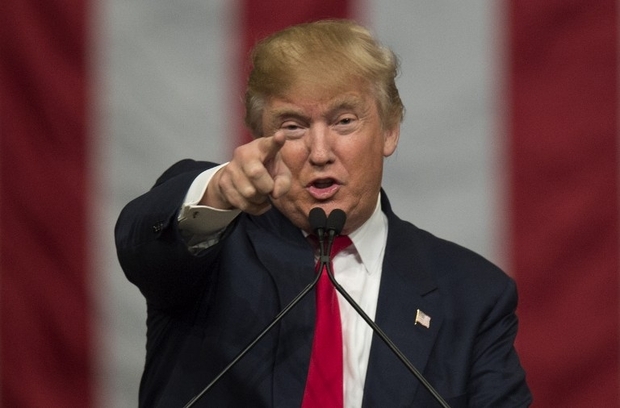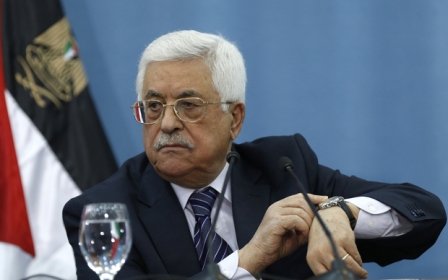Peace in Palestine: The Donald Trump, Tony Soprano connection

Devouring the transcript of the New York Times interview with Donald Trump on an iPad at 4am as one does these days (an insomniac’s way of consuming post-truth news), one question at least was answered.
Who has just become the most powerful man in the world? Tony Soprano, obviously.
Tony, like Donald, has a family. Tony, like Donald, has a business, from which he is inseparable. Tony, like Donald, feels unloved and misunderstood.
Trump's words to the NYT could have come straight out of the New Jersey mobster’s mouth: “Paul Ryan right now loves me, Mitch McConnell loves me, it’s amazing how winning can change things. I’ve liked Chuck Schumer for a long time. I’ve actually, I’ve raised a lot of money for Chuck and given him a lot of money over the years. I think I was the first person that ever contributed to Chuck Schumer. … I don’t know if he’s willing to admit this, but I believe it was his first campaign contribution, $500. But Chuck Schumer’s a good guy. I think we’ll get along very well.”
I am a fan of Tony Soprano. In my eyes, he is up there with Malvolio, King Lear and Lady MacBeth. But in just a few weeks’ time, this fictional character is about to ease his frame into the Oval Office, and that event will have consequences.
We will get a golf course owner’s view of global warming. We will get a property developer's view of planning regulations. And here in the Middle East, we will get a dealmaker’s view of Palestine, aided and abetted by his consigliere, and son-in-law (who else?) Jared Kushner.
“Jared’s a very smart guy. He’s a very good guy. The people that know him, he’s a quality person and I think he can be very helpful. I would love to be able to be the one that made peace with Israel and the Palestinians. I would love that, that would be such a great achievement. Because nobody’s been able to do it.”
Kushner is ideally suited to the job. An orthodox Jew, he helped Trump write his speech to AIPAC, in which the presidential candidate said that Palestinians must scrub their hatred of Israel from their educational system and stop naming public places after people who attacked Israel. Trump said the US must stand with Israel in rejecting attempts by the United Nations to impose restrictions on Israel or parameters for a peace deal.
The Palestinians can’t wait. 2017 marks the 50th year of the occupation and true to form, it has never appeared so bleak. Allow me to sketch out the shape of the latest coffin in the grave of an end of conflict.
Israel itself is running towards 2017 with several key decisions under its belt. It has banned the Northern Branch of the Islamic Movement, which accounts for 42 percent of the vote of Palestinians with Israeli citizenship. Then police raided and arrested members and leaders of the secular Balad party, one of four in the Joint Arab List in the Knesset, in an inquiry about foreign funding.
Binyamin Netanyahu, meanwhile, is into noise abatement. How can he mute the Muslim call to prayer?
"I cannot count the times - they are simply too numerous - that citizens have turned to me from all parts of Israeli society, from all religions, with complaints about the noise and suffering caused them by the excessive noise coming to them from the public address systems of houses of prayer," Netanyahu said in cabinet.
After a minor hiccup, caused by the ultra-Orthodox anxiety that synagogues would be forced by the same measure to stop broadcasting the onset of the Sabbath, the bill’s drafters have come up with a salami slice solution: the measure will apply only between 11pm and 7am, silencing the first of five daily calls to prayer before dawn. The daily tweets of government ministers are inflammatory. The latest one is a tweet by Naftali Bennett, the education minister, who said about a series of suspected arson attacks that " the only ones capable of setting fire to the land are people to whom it does not belong" implying that they were Arabs.
Outside Israel, the mood is darker still. Both Fatah and Hamas face leadership contests. Gaza is now in the 10th year of its siege, living in the rubble of three major Israeli incursions, and many more minor ones. Two Turkish ships have come and gone, providing 400 lorry-loads of provisions, half of what the enclave consumes in one day.
Hamas is using inventive ways to pry open the Rafah border with Egypt, which since a military coup in 2013, has emerged as the most brutal enforcer of the siege, disturbing even Israeli military intelligence with its ardour.
At his recent meeting in Doha with Hamas officials, the Palestinian President Mahmoud Abbas complained about the decision of the Gaza authorities to allow Fatah men to attend a conference in Ain Al Sokhna.
The visits of Gazans to Egypt are arranged in three groups: academics, businessmen and politicians of all factions. The irony of the head of Fatah complaining to Hamas over the movements of Fatah members in Gaza was not lost on those present.
Except of course everyone knew that these Fatah men were not loyal to Abbas, but to his bitter rival Mohammed Dahlan.
A source briefed on the meeting said: “Hamas has always said to Abu Mazen: this is an internal problem. It’s your problem. You have to solve it. Not us. Hamas is not giving a guarantee we will be with you or the other side. It’s trying to stay neutral. The main thing is not have clashes between us and the two groups, as [has] happened in the camps in the West Bank.”
And so onto the main event: Fatah’s war of succession. The 81-year old Abbas is determined to keep Dahlan out of the Fatah central committee from which he was expelled amid various allegations of corruption in 2011. As I have reported previously, Egypt, Jordan, and the Emirates are determined to see Dahlan replace Abbas as the de facto leader of the PA, PLO and Fatah.
Dahlan retained his immunity from prosecution as a serving MP, albeit of the Palestinian Legislative Council, a parliament that has not met for nine years. That immunity was severed by a court, the Palestinian Constitutional Court, set up by Abbas for that very purpose.
The main arena for this contest will be the seventh Fatah Congress next week. Will it be a big tent that aims to rebuild the party’s shattered legitimacy from the bottom up and re-unite Fatah's fractured factions? One clue about Abbas’s intention came in his meeting with Hamas in Doha.
Abbas did not just complain to Hamas about Dahlan’s men in Gaza. He wanted a favour. Would Hamas allow 300 of Abbas’s supporters to attend the congress in Ramallah? Of course, came the reply.
Another clue about the congress came with the information that Abbas has instructed the organisers to reduce the list of delegates from 1900 to 1300.
This, by all accounts, is likely to be a managed affair to produce an outcome specifically scripted by Abbas himself. Will Abbas assign a Fatah vice-president, a PLO vice chairman, and a PA vice president - instead of assigning all three roles to one man? The signs are Abbas will impose a solution to his succession and that his solution will go the way of all flesh.
Neither Abbas nor Dahlan can offer the Palestinians elections, renewal, rebuilding, and revitalisation. Hamas will stay contained in Gaza, although Egypt has promised Gaza to open Rafah to freight traffic, which would be a first if that happened. No one is holding their breath.
This, then, is the scene that awaits the dealmaker Trump. The number of settlers will shortly reach 800,000, more than 350,000 of them in East Jerusalem, with plans to reach a million in a few years. To them Trump’s election is manna from heaven.
The traffic light on a greater Israel, which Barack Obama and previous US presidents set on red, without enforcing any penalties for going through it, has now changed to green. This then is an extremely dangerous time for the Palestinian cause. Absolutely no one outside of Palestine is going to bat for the cause - neither Jordan, nor Saudi Arabia, nor Egypt, all of whom want to impose a leader on them in Dahlan, who will do what Israel and the US tell him to do.
This lays the ground work for an even more cataclysmic decay of authority inside the West Bank, which would could let in all manner of actors, with whom, a priori, there is no negotiation. Whatever else that can be said of the Palestinian resistance to occupation, it has managed to stay nationalist and political in nature, not religious or fundamentalist, whatever one thinks of Hamas. That barrier now stands in danger of collapsing. Leave the conflict in the hands of Israel’s current extreme right coalition, and its settlers, and that is exactly what will happen.
“Hey, what did I do?” the unloved Tony will say in four years' time. Nothing, his detractors will reply. And doing nothing for four more years will be enough to tip this conflict over the edge.
- David Hearst is editor-in-chief of Middle East Eye. He was chief foreign leader writer of The Guardian, former Associate Foreign Editor, European Editor, Moscow Bureau Chief, European Correspondent, and Ireland Correspondent. He joined The Guardian from The Scotsman, where he was education correspondent.
The views expressed in this article belong to the author and do not necessarily reflect the editorial policy of Middle East Eye.
Photo: Donald Trump told the New York Times he would 'love to be able to be the one that made peace with Israel and the Palestinians' (AFP)
This article is available in French on Middle East Eye French edition.
Stay informed with MEE's newsletters
Sign up to get the latest alerts, insights and analysis, starting with Turkey Unpacked
Middle East Eye delivers independent and unrivalled coverage and analysis of the Middle East, North Africa and beyond. To learn more about republishing this content and the associated fees, please fill out this form. More about MEE can be found here.





